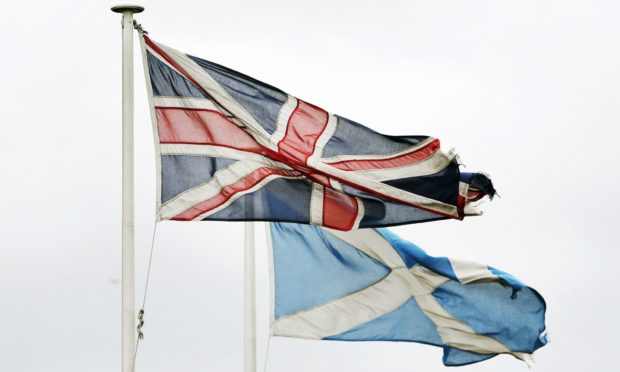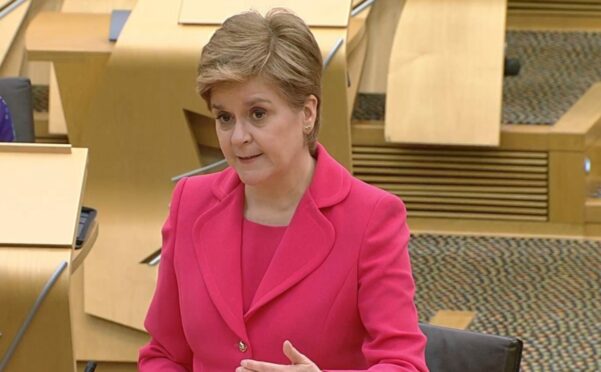The SNP’s own policy chief admits his party must provide “clarity and certainty” to voters over pensions in an independent Scotland or risk undermining its own financial credibility.
The latest intervention, from policy convener Toni Guigliano, follows a renewed focus on who would pay for state pensions if Scotland decides to walk away from the rest of the UK.
The SNP appeared to shift its position seven years after the 2014 vote, sparking claims voters are being misled.
Here we take a look at why the policy is back under the spotlight, and how it might affect pensions if Scots were to vote for independence.
What does the SNP say about pensions?
The pensions row was reignited when SNP Westminster leader Ian Blackford insisted the UK Government would continue payments to older people living in Scotland after independence.
Mr Blackford claims Scots workers would have a right to receive a state pension after years of paying National Insurance contributions to the UK Treasury.
He pointed to the example of pensioners who chose to retire abroad but can still claim their basic pension as evidence of this.
Mr Blackford told ITV Border that in 2014 the chief secretary to the Treasury “made it clear the UK retained an obligation to pay pensions to those who had paid National Insurance” and that it is “a matter of precedence”.
He added: “The point is, it’s an obligation on the UK Government to meet the commitment to pensioners who have paid National Insurance contributions.
“They have paid the right to receive that pension. You can argue about the mechanism over how that is transferred, and that will be debated, but it’s right the UK Government meets its right to pensioners, regardless of where they are.”
Nicola Sturgeon doubles down
SNP Finance Secretary Kate Forbes says she agrees with Mr Blackford’s assessment that pension rights would be “unaffected”.
But this appears to be a significant departure from the SNP’s stance during the last independence referendum.
The Scottish Government’s own report from 2013 stated: “For those in Scotland in receipt of the UK State Pension at the time of independence, the responsibility for paying that pension would transfer to the Scottish Government.”
Nicola Sturgeon appeared to double down on the party’s new position after being asked about pensions at the Scottish Parliament.
The first minister was criticised for repeating comments from a former UK pensions minister that he later clarified.
She told MSPs: “When Scotland votes for independence, as was the case in 2014, the distribution of existing UK liabilities and assets, including those related to pensions, will be subject to negotiation.
“But the key point is for those in receipt of pensions, and it is what the minister for pensions in the UK Government at the time, Steve Webb, confirmed: that people with accumulated rights would continue to receive the current levels of state pension.”
However, Mr Webb clarified his remarks days after he first made them in 2014, saying it would be for an independent Scottish Government to pay its own state pensions.
Ms Sturgeon has since confirmed responsibility for existing pensions will “transfer to the Scottish Government”.
She said: “It is for a Scottish Government to be responsible for the payment of pensions but the historic liabilities and assets around pensions, as around other things, will be a matter of negotiation at the point of independence.”
How did the UK Government respond?
Nicola Sturgeon and Ian Blackford have been accused by current pensions minister Guy Opperman of “once again misleading Scots”.
He said: “If Scotland chooses to become a foreign country, then working English, Welsh and Northern Irish taxpayers should not pay for a foreign country’s pensions liabilities.
“That has been the settled position of the UK government since before the 2014 referendum.”
However, the UK Government’s official position ahead of the 2014 vote was that “the governments of Scotland and the UK would need to apportion responsibility for UK state pension rights built up before independence”.
Treasury officials went on to state that “the untangling of past records would be a complex exercise and that the government of an independent Scotland would also need to contribute to the state pension costs of people living overseas, some of whom would have worked in Scotland”.
So what is really going on?
There are two key factors to remember when considering how pensions in an independent Scotland could work.
The first is that there is no ringfenced National Insurance fund because pensions are instead paid out of current state tax revenue.
Access to UK pensions is based on an individual making sufficient National Insurance contributions, rather than any consideration of citizenship, but this money is not held in any kind pension “pot”.
The second is that complex issues such as pensions and social security, trade, borders and national defence would likely be decided by months and years of negotiating, similar to the Brexit withdrawal deal.
David Eiser, a fellow of the Fraser of Allander Institute, and David Bell, professor of economics at Stirling University, published a paper warning of the complexities.
Who pays the state pension in an independent Scotland? Article from @david_eiser & Professor David Bell from today's @heraldscotland. Read more here: https://t.co/yqQyHF0N7h
— Fraser of Allander Institute (@Strath_FAI) February 5, 2022
They point out that because individuals have no “ownership rights” over past contributions, the UK Government can change qualifying rules for state pension payments as it sees fit, as seen in the recent shift in retirement age.
How does it work for other independent countries?
The UK Government already pays pensions to those who retire abroad providing they have made sufficient National Insurance contributions.
That is why the SNP argues it would be inconsistent to pay a pension to someone living in France but refuse it to someone with similar contributions living in a newly independent Scotland.

But Mr Eiser and Mr Bell believe the UK Government could argue the transfer of a significant share of the UK’s tax base to the Scottish Government post-independence is an unprecedented change of circumstances.
It could then ask the Scottish Government to make a “reasonable contribution” to the costs of the state pension in Scotland.
The pair argue this would become part of wider negotiations around the division of assets and liabilities in general.
The UK has social security agreements with many countries setting out how payments are calculated when people have made contributions in more than one country.
The pensions issue cannot be cleaved off from other negotiations so failure to reach a similar deal in Scotland would likely cause major economic problems for both sides.
There will be an 'obligation' on the UK Government to pay the pensions of Scots after independence, @Ianblackford_MP insists.
SNP Westminster leader is adamant paying National Insurance means 'a right to a UK pension, no ifs and no buts'.
Full interview: https://t.co/qYcszuWW83 pic.twitter.com/jvz0ZjWeCl
— Representing Border (@ITVBorderRB) February 3, 2022

